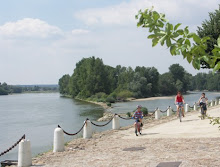We often get asked by our guests what education is like in
France, and how it is different from where they live. Now that between them our boys have
experienced all levels of French education from ‘petit section’ (first year of
nursery school) through to university, I thought I would describe the system of
state school here. This is very much our
personal experience and I understand that school hours/systems may be slightly different
throughout France, but hopefully this will give you an idea.
Compulsory education in France begins at age 6. However, all children from age 3 are
guaranteed a free nursery school place and so most children start earlier than
6, albeit maybe on a part-time basis.
The 3 years of nursery school are called petit, moyen and grand sections
and emphasis is on learning through play.
School hours are from 9.00am to 4.30pm four days a week, with an hour
and a half break for lunch (at this age, certainly here in a rural area, most
children go home for lunch). In petit
section, Max and his classmates all went to a little dormitory after lunch for
a sleep.
Primary school runs for 5 years, to age 11. The hours are the same and still 4 days a
week; here our boys had Wednesdays off.
Starting from 2013 or 2014, this is being changed to 4 1/2 days, to
include Wednesday mornings. Emphasis at
primary age is on learning the basics - lots of French grammar and conjugation
- plus the introduction of science, history/geography (one subject), art,
music, English, computer studies and sport.
At our boys’ school desks are arranged in rows facing the blackboard and
work is in the main done individually with little talking (too much and you are
moved to a desk by the teacher - we know this from experience...!). The children are tested often, at the end of each 'module' and in all
subjects (including sport).
Collège (senior school) comes next; 4 years of study with
everyone following the same syllabus and subjects. School hours are now 8.30am to 5.00pm four
days a week, plus 8.30 to 12.30 on Wednesdays, all still with a 90 minute lunch
break. At our boys' college there were
also lots of lunchtime clubs - Adam was involved in a cinema club which
produced a film at the end of the year, and Max's rugby team recently came 2nd
in the regional competition. Constant
testing continues through collège, culminating in the Brevet exam - French,
Maths, History/Geography, plus an English oral exam and computer skills
testing.
After collège, students have a choice – the main options
being academic or vocational Baccalaureats, or other vocational qualifications
intended to lead to a specific career or work.
We only have experience of the academic Bac – which for Adam (having chosen
the science stream) involved studying French, maths, physics/chemistry,
biology, history/geography, English, German, sport and , in the final year,
philosophy. Study was for 3 years,
school hours 8.00am to 6.00pm four days a week and 8.00am to 1.00pm
Wednesdays. Still the same constant
testing and a final exam in all subjects – to pass you have to gain an average
over all subjects of at least 10/20.
Whilst the vocational study route often leads to a job (or
job hunt these days) at the end - although students can of course opt for
further studies – an academic Bac is seen as a stepping stone to further
studies only, usually a minimum of 3 years.
Again there is a choice of route – for those students with a clear idea
of their future career this is often at a specific ‘school’ (engineering,
medical, business, law); otherwise the route is university. For this latter the entry requirement is a
pass at Bac; for the other options there is usually a more selective process
which can include Lycée (high school) results, an entrance exam and/or an
interview. Interestingly, for medical
school only a Bac pass is needed; halfway through the first year there is an exam
process and failure at this means you leave medical school immediately.
Most students at this level choose a school or university
close to home and many travel daily to their studies whilst living at
home. On site campus accommodation is
rare so students wishing to live away from home usually have a privately rented
apartment (studio/bed-sit/cupboard with a bed and toilet!!).
After a 3 year ‘licence’ (degree) students can enter a job
at certain prescribed levels; further study (masters or the equivalent) opens
opportunities at a higher level (and the chance to progress further). This prescribed system of linking
qualifications so closely with career progression - as opposed to experience or aptitude - means
that many years of study ‘post-Bac’ are common; jobs are usually advertised
with qualifications stated as Bac+ a number – representing the number of years
study beyond the age of 18 – and Bac+5 or more is pretty common. So the fact that state university is (for the
moment) free tuition-wise is a big bonus for those of us just setting off on
this stage of our childrens’ education!
Whether the French system is better, worse or just different
from the UK is impossible to quantify; Adam was 8 when we moved here so really
we have only experienced the French system.
They do of course have the benefit of being bilingual and, to some
extent, of experiencing both cultures. How
much of a benefit that is to them in adult life, only time will tell…but its
all part of the adventure.



No comments:
Post a Comment